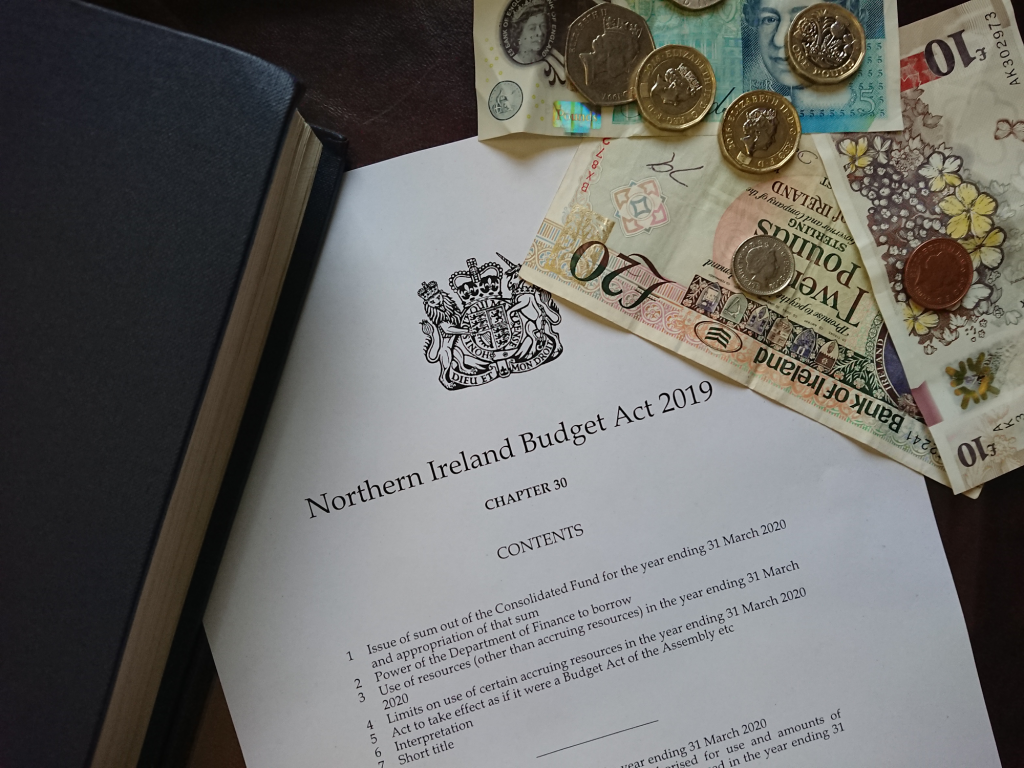
This blog article provides an update on Northern Ireland public finances in the absence of fully functioning devolved government. It explains recently enacted budget legislation and notes political developments of relevance to future Northern Ireland budgets.
Westminster’s recent enactment of budget legislation
On 31 October, the United Kingdom (UK) Parliament passed the Northern Ireland Budget Act 2019 (2019 Act), accompanied by a supporting financial document. It is unusual to seek such authorisation from Westminster, and so close to the financial year-end. Under fully functioning devolution in Northern Ireland, the Executive would seek such authorisation from the Assembly. Moreover, this typically would occur each June, followed by the Assembly’s enactment of legislation. However, as a recent House of Commons Library briefing explained:
In the absence of the Northern Ireland Assembly, the [Northern Ireland Budget Bill 2019]… sets a Budget for Northern Ireland.
The 2019 Act concerns Northern Ireland’s 2019-20 Budget, but it does not change that Budget. Rather, it provides the relevant authority to release expenditure to Northern Ireland departments and other bodies (out of the Consolidated Fund – in effect the Northern Ireland bank account through which all public money flows). It also authorises departments’ use of resources and borrowing, as appropriate.
Simply stated, the 2019 Act provides funding and leaves spending decisions to departments, within their specified expenditure allocations, despite the lack of a fully functioning devolved government. In doing so, it enables ongoing public service delivery in Northern Ireland for the remainder of the current financial year, which ends on 31st March 2020.
Next year’s public purse and recent political developments
Although not directly connected to the 2019 Act, three recent political developments in the UK are worth noting here, given their relevance to Northern Ireland’s public finances in future, in particular its 2020-21 Budget. These include:
- A one-year 2019 Spending Review,
- A cancelled 2019 Autumn Budget, and
- The call for Westminster elections.
One-year Spending Review 2019
Usually a UK Spending Review sets spending ceilings for the UK Government, for a three to four year interval. The typical pattern is the UK Government announcing its proposed overall (or ‘aggregate’) spending limits; and then it deciding on Departmental allocations, following on from talks between Treasury Ministers and other ministers.
In September 2019, the then UK Government decided to have a single, not the usual multi-year Spending Review. It apparently did this to bring financial certainty while delivering Brexit. The Chairperson of the Office of Budget Responsibility wrote to the Treasury Select Committee, explaining that Spending Round 2019 was unusual because:
…it covers only on full fiscal year (2020-21); second, the aggregate limits and departmental allocations have been announced together.
The Chairperson’s letter continued, stating that this was because the UK Government wanted to give:
…departments and the devolved administrations the financial certainty needed to focus on delivering Brexit on 31 October.
So, rather than produce a multi-year plan as usual, the Treasury produced a single-year ‘stop-gap’ Spending Round.
Nonetheless, it is worth noting that the 2019 Spending Round did deliver just over £400 million in extra spending power for Northern Ireland in 2020-21, compared to the current year. However, further legislation is required to authorise, allocate and spend that money in the next financial year; and of course, the outcome of the ongoing UK General Election (see below) could affect the amount.
Cancellation of the 2019 Autumn Budget
A further political development is the UK Chancellor’s cancellation of the Autumn Budget on 6 November 2019, due to ongoing political uncertainty arising from Brexit. It seems reasonable to think that the new Government will revisit the lack of an Autumn Budget soon after taking office.
Call for Westminster elections
At the end of October 2019, the UK Government called for a General Election and the dissolution of Westminster. Subsequent to the awaited results of the December vote, the newly elected UK Government will focus its attention on public spending and taxation, making decisions for the upcoming financial year and thereafter, while factoring in a vast array of considerations, such as Brexit and Northern Ireland political circumstances.
So for now, we pause, and await the details of Northern Ireland’s public purse for 2020-21 and beyond.

